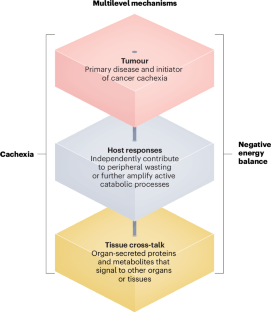Cancer cachexia: multilevel metabolic dysfunction
IF 18.9
1区 医学
Q1 ENDOCRINOLOGY & METABOLISM
引用次数: 0
Abstract
Cancer cachexia is a complex metabolic disorder marked by unintentional body weight loss or ‘wasting’ of body mass, driven by multiple aetiological factors operating at various levels. It is associated with many malignancies and significantly contributes to cancer-related morbidity and mortality. With emerging recognition of cancer as a systemic disease, there is increasing awareness that understanding and treatment of cancer cachexia may represent a crucial cornerstone for improved management of cancer. Here, we describe the metabolic changes contributing to body wasting in cachexia and explain how the entangled action of both tumour-derived and host-amplified processes induces these metabolic changes. We discuss energy homeostasis and possible ways that the presence of a tumour interferes with or hijacks physiological energy conservation pathways. In that context, we highlight the role played by metabolic cross-talk mechanisms in cachexia pathogenesis. Lastly, we elaborate on the challenges and opportunities in the treatment of this devastating paraneoplastic phenomenon that arise from the complex and multifaceted metabolic cross-talk mechanisms and provide a status on current and emerging therapeutic approaches. In this Review, the authors highlight cancer cachexia as a complex and multifactorial disorder, and discuss the underlying host-driven and tumour-driven metabolic changes, therapeutic opportunities and the pertinent challenges in the treatment of cancer cachexia.


癌症恶病质:多层次代谢功能障碍
癌症恶病质是一种复杂的新陈代谢紊乱,其特征是身体重量无意中减轻或体质 "消瘦",由多种致病因素在不同程度上造成。癌症恶病质与许多恶性肿瘤有关,是导致癌症相关发病率和死亡率的重要因素。随着人们逐渐认识到癌症是一种全身性疾病,人们越来越意识到,了解和治疗癌症恶病质可能是改善癌症管理的重要基石。在这里,我们描述了导致恶病质中身体消瘦的代谢变化,并解释了肿瘤衍生过程和宿主增强过程的纠缠作用是如何诱发这些代谢变化的。我们讨论了能量平衡以及肿瘤的存在干扰或劫持生理能量守恒途径的可能方式。在此背景下,我们强调了代谢交叉对话机制在恶病质发病机制中的作用。最后,我们阐述了治疗这一毁灭性副肿瘤现象的挑战和机遇,这些挑战和机遇源于复杂和多方面的代谢交叉对话机制,并提供了当前和新兴治疗方法的现状。
本文章由计算机程序翻译,如有差异,请以英文原文为准。
求助全文
约1分钟内获得全文
求助全文
来源期刊

Nature metabolism
ENDOCRINOLOGY & METABOLISM-
CiteScore
27.50
自引率
2.40%
发文量
170
期刊介绍:
Nature Metabolism is a peer-reviewed scientific journal that covers a broad range of topics in metabolism research. It aims to advance the understanding of metabolic and homeostatic processes at a cellular and physiological level. The journal publishes research from various fields, including fundamental cell biology, basic biomedical and translational research, and integrative physiology. It focuses on how cellular metabolism affects cellular function, the physiology and homeostasis of organs and tissues, and the regulation of organismal energy homeostasis. It also investigates the molecular pathophysiology of metabolic diseases such as diabetes and obesity, as well as their treatment. Nature Metabolism follows the standards of other Nature-branded journals, with a dedicated team of professional editors, rigorous peer-review process, high standards of copy-editing and production, swift publication, and editorial independence. The journal has a high impact factor, has a certain influence in the international area, and is deeply concerned and cited by the majority of scholars.
 求助内容:
求助内容: 应助结果提醒方式:
应助结果提醒方式:


